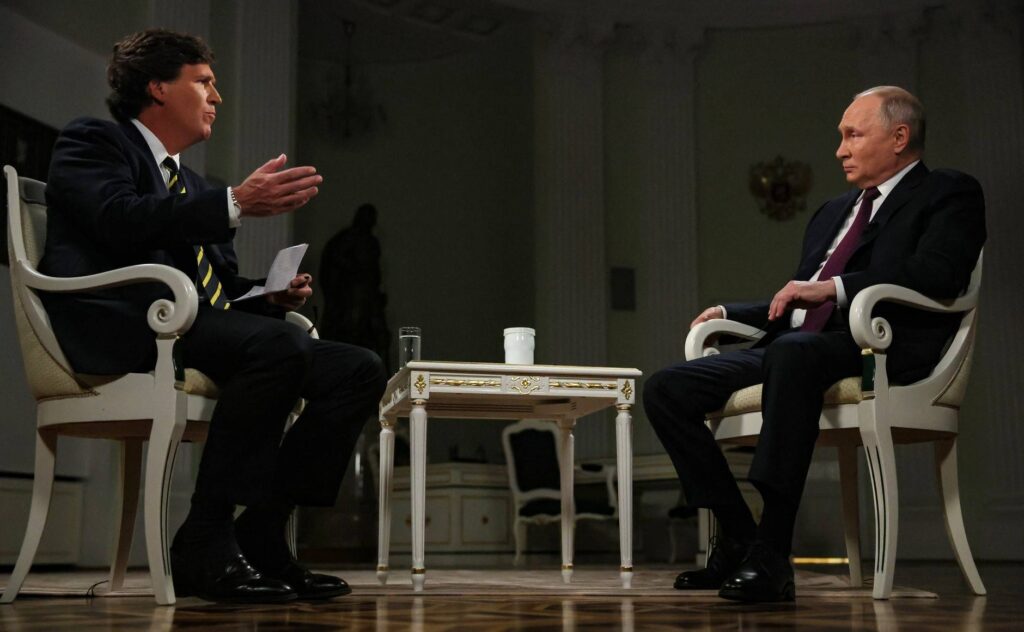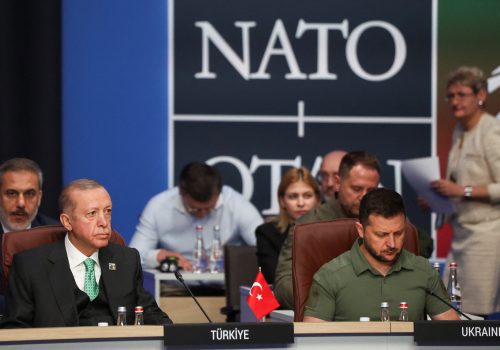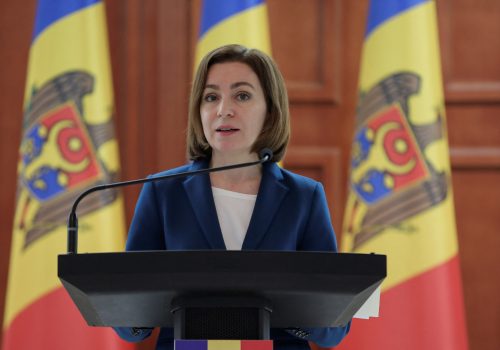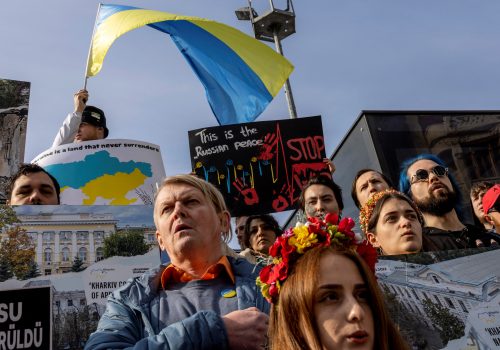While it may have strayed from journalistic convention, Tucker Carlson’s orchestrated chat with Russian president and indicted war criminal Vladimir Putin should be closely watched in Turkey. Though Putin took the opportunity to contradict historical facts and pure common sense, the interview offers valuable insights into how the Russian leadership views its relations with neighboring countries.
During more than two hours of what a European Commission spokesperson called “old lies, distortions, and manipulations, and . . . hostility towards the West,” Putin demonstrated a morbid obsession with Russian imperial grandeur, justified the invasion of neighboring states, and showed zero respect for international law and peace treaties.
As a country that has spent more years in wars with Russia than with any other rival and that has competed for dominance in the Black Sea and Mediterranean Sea over centuries, Turkey should not take the Russian threat lightly.
Watch Russia’s claims on “Constantinople”
In February 2023, while Turkey was still recovering from a devastating earthquake, Russian State Duma Member Semyon Bagdasarov issued a call to attack Turkey and annex Istanbul: “Turkey is the historical lands of Russia. Turkey is now in a dire situation. Let’s take advantage of this and return our lands. Let’s squeeze it out of the Central Asia, undermine its influence in Ukraine, drive it out of the South Caucasus, raise certain forces in Turkey and return what historically belonged to us—Constantinople.” He went as far as to suggest that “the crisis in Turkey must end up in its collapse” and in Russia’s return to Istanbul: “We will erect a cross over the Church of Hagia Sophia and reveal frescoes that are now hidden from people. And we’ll put on music—a prayer in Aramaic or perhaps in Russian.”
References to “Constantinople”—a name now seen only in history textbooks in most other countries—are still frequently seen in Russian modern political rhetoric. In fact, Aleksandr Dugin (the ideologue, sometimes referred to as Putin’s philosopher, behind the ultranationalist Eurasianism movement in Russia and one of the most agile agitators and propagandists of Eurasianism globally) for years was running a popular TV channel called Telekanal Constantinople. Later, he became a mastermind of the Russian Orthodox TV channel Tsargrad, which is owned by Russian oligarch Konstantin Malofeyev (currently on the European Union sanctions list for his support of the 2014 invasion of Ukraine). Tsargrad is another name used within Russia for contemporary Istanbul, meaning “the city of the emperor”—another reminder of Russia’s imperial nostalgia for control over the Black Sea
Some Russian opinion leaders have not abandoned the idea of conquering Istanbul when the opportunity arises. For example, Alexey Vladimirovich Oleynikov (a professor at a Russian public university) argued in 2020 that over the course of the twentieth century, Russia missed two opportunities to “decide the fate of” the Turkish straits—the Dardanelles and the Bosphorus—and that Moscow should not miss its “third chance”: “At the present stage of history Russia has the third one. It is obvious that at present the most acceptable option for Russia is the internationalization of Constantinople and the straits.”
Oleynikov writes that “Constantinople could well receive the status of a free self-governing city. This would be natural: After all, Turkey already has a capital—Ankara.” And later, he elaborates that “historically, Constantinople should be controlled by Russia but owned by Greece.” If that is not to happen, the professor suggests that the internationalization of Constantinople and the straits could be maintained “under the control of great powers with a special status for Russia—a great power in the Black Sea.” His ideas resonate with Bagdasarov’s calls to take advantage of a weakened Turkey: “Turkey itself, torn apart by problems and contradictions, is finding it increasingly difficult to single-handedly control the fate of the strategic region of Europe.” Of course, Russia is always eager to offer help.
Be wary of historical justifications
It isn’t only Istanbul that has been contested. For example, a blogger with nearly 140,000 subscribers on the popular Russian media platform Dzen wrote that Russians “quickly forget about” their “rich imperial past, in comparison with which the achievements of the USSR already seem like awkward attempts to restore the status quo.” He continues, “today we will talk only about part of . . . eastern Turkey, which, after the end of the Russian-Turkish War in 1878, was added to the Russian Empire, namely the Kars region, located on the modern territory of three Turkish regions: Kars, Ardahan, and Erzurum.” Later, the blogger blames the “Bolsheviks of the young Soviet state” for “mediocrely transferring these territories to Turkey in exchange for assistance in consolidating Soviet power in Transcaucasia” under the Moscow Treaty of 1921.
Russian historical grievances have become particularly evident in times of crisis. For instance, in December 2015, a Russian Sukhoi Su-24 tactical bomber violated Turkish air space and was downed by the Turkish air forces. As BBC Russia put it at the time, the event “brings to mind the long and dramatic history of the Black Sea straits”—including Russia’s past claims on Turkish territories. In November 1940, then-Premier of the Soviet Union Joseph Stalin reportedly told the head of the Communist International that the USSR “will drive the Turks out to Asia. What kind of Turkey is this? There are two million Georgians, one and a half million Armenians, one million Kurds. They are only 6-7 million Turks.” And according to Russian historian Alexander Goryanin, Stalin planned to invade Turkey from the Caucasus and Bulgaria at the end of World War II, but that plan went down the drain with Ankara’s joining the anti-Hitler coalition in February 1945.
At the 1945 Potsdam Conference, Stalin expressed his desire to obtain the eastern Turkish provinces of Kars and Lazistan (in northeastern Turkey), and a naval base in the Dardanelles. The partners at the conference responded that Turkey did not fight on Hitler’s side and that there was nothing to punish it for. After the end of the war, it was Soviet demands for joint control over the straits and territorial claims over the eastern regions of Turkey that became a driving force behind Turkey’s decision to seek NATO membership.
Given Putin’s ardent passion for the restoration of Stalin’s legacy, Ankara should carefully take note of this history.
Resist efforts to divide NATO
The Russian threat to Turkey might seem exaggerated, as the country is now a NATO member with the second-largest military in the Alliance.
However, before Russia attacks with armies of tanks, it attacks with armies of bots and trolls. In Russia’s way of war, cognitive warfare unfolds first—paving the way for a kinetic war effort. And in the battle for hearts and minds, with the Russian news agency Sputnik, the television network RT, and the Rossotrudnichestvo (a cultural agency under the Russian Ministry of Foreign Affairs) still operational in Turkey, the country remains highly vulnerable to Russian penetrations.
A RAND study on Russia’s use of media and information operations in Turkey outlined the goals of Russia’s media efforts in Turkey: 1) to undermine NATO unity and instigate suspicion between Turkey and its Western allies; 2) to enlist Turkey’s support in and erode its opposition to Russian activity in Eurasia and the Middle East; and 3) to influence Turkey’s politics and make Ankara a more “compliant” partner. It also highlighted that in Turkey, Russian media is primarily focused on fueling anti-US discourse, which could help push Ankara into Russia’s embrace.
Back in 2007, Dugin had explicitly outlined this aim in a book he wrote (and published only in Turkish) on what he called the Moscow-Ankara axis: “It is important that anti-Americanism unites three morally different, sometimes antagonistic forces in Turkish society: leftists, nationalists, and representatives of religious circles. Such a wide range shows that Eurasianism in Turkey has great prospects, far beyond the level of any single political force or party.” This message has been amplified by Turkish Eurasianists who have relentlessly promoted a narrative that Ankara should always support Russia, because—as one Turkish proponent put it—“if Russia falls, Turkey will be the next one to be divided by NATO.”
As Putin continues his efforts to restore the Russian empire, Ankara must remain clear-eyed about the real threats to its national security. It’s not a risk of being divided by NATO, but a risk of a divided NATO that would leave Turkey most vulnerable to Russian revisionism in the region.
Yevgeniya Gaber is a nonresident senior fellow at the Atlantic Council IN TURKEY and a professor at the George C. Marshall European Center for Security Studies. Follow her on X, formerly known as Twitter, @GaberYevgeniya.
The opinions expressed here are those of the author and do not reflect the official policy or position of the George C. Marshall European Center for Security Studies, the US Department of Defense, or the US government.
Further reading
Thu, Aug 3, 2023
The West must back Ukraine and Turkey to counter Russia’s attempts to control the Black Sea
TURKEYSource By Yevgeniya Gaber
Russia’s efforts to gain control in the Black Sea need to be challenged. Here’s how Ukraine and Turkey can push back with the West’s help.
Fri, May 5, 2023
To secure the Black Sea, the West must help Moldova stand up to Russian aggression
TURKEYSource By Arnold C. Dupuy
Moldova is working on orienting itself more closely with the West, but it needs support to fend off Russian pressure and attempts to gain influence.
Wed, Mar 1, 2023
One year into the war, it’s time for Turkey to reconsider its Ukraine-Russia balancing act
TURKEYSource By Yevgeniya Gaber
With dim prospects for peace talks in the foreseeable future, now is the time for Turkey to unequivocally support Ukraine.
Image: Russia s President Vladimir Putin gives an interview to US talk show host Tucker Carlson at the Kremlin in Moscow Russia s President Vladimir Putin gives an interview to US talk show host Tucker Carlson at the Kremlin in Moscow on February 6, 2024. Photo by President of Russia Office apaimages.



